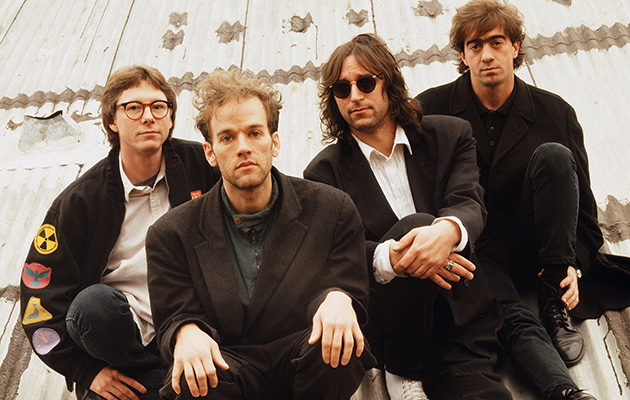http://www.youtube.com/watch?v=if-UzXIQ5vw
Michael Stipe is not the most important member of REM, but without him they are a lot less interesting. Without him they are in fact the trés ordinaire pub band, Warren Zevon’s cronies the Hindu Love Gods. But that, as they say, is another story.
As frontman, Stipe has been the band’s obvious visual focus, using performance art shock tactics, punk vigour and a perplexing array of props to animate the group’s musical explorations. As a lyricist, he’s provided the richest treasure trove in the past decade of American rock. His early songs – where words were barely enunciated and often allusive – intrigued because of the curious and cautious approach to the use of voice and language.
More recently, Stipe has shown a willingness to use subversive slogans, to sing his pleas and protestations in a voice that is loud and clear. His voyage of discovery hit a new keynote when he launched the clarion call “Let’s begin again, like Martin Luther Zen…” on the regenerating Lifes Rich Pageant (1986). On the raging, guitar-heavy Document (1987) he railed in the face of America’s military industrial power complex (“What we want and what we need has been confused”). Green (1988) fit the times like a glove with its end-of-the-era leap into dream logic informed by an undertow of fear and dread.
Stipe set himself a challenge with Out Of Time; the album was to be a collection of love songs. Perhaps it’s only natural that out of this pressure-cooker of personal relationships should come songs that have wider implications. As his country prepares to wage war with itself – policemen of the New World Order and bankrupt brokers for the United States Of Excess – Stipe’s songs on Out Of Time grab the zeitgeist better than anything else around.
Your one-on-one love songs seem to concentrate on the dark side of love, on the confusion and despair that goes into a relationship.
“I think it’s a lot easier to write a depressing song than a happy one. On the scoreboard of emotions, sad is easy to capture. Happiness is a little harder to capture, especially in a pop song, without coming off as a bit of a dit. Everything is becoming a little flowery and stupid in pop songs when you’re trying to be happy.”
“Shiny Happy People” couldn’t be more upfront. It’s a love vibe for ’91’s flower children, but it’s not describing a one-on-one relationship.
“It’s the happiest song we’ve ever put out – some people want to write in irony, but
I tell them that’s just you. I meant it as an incredibly happy song. That song was about trying to match a vocal to the guitar line which wouldn’t compromise the incredible happiness of the guitar. To me the guitar line was the greatest melody I’d ever heard. I told Peter for two months that I wasn’t going to write a chorus because I didn’t want to blow the guitar line by singing over it. But he insisted that I did and it worked and the video, God, the video, is just the happiest thing I’ve ever seen…”
“Country Feedback” seems to be everyone’s favourite track on the album.
“I didn’t even write that song. I just had all the words down on a sheet out of my notebook and walked into the studio and put on the headphones and sang it. It wasn’t even meant to be released, we were still doing demos at the time. But the next morning we played it and it sounded so great we just kept it the way it was.”
Bill Berry said that it had the feeling straight away. As a band you all put great stock in the ability to conjure something from nothing.
“Having the freedom to be spontaneous is something we might have over Bruce Springsteen or George Michael. I probably have a lot more respect for the former than the latter as an artist. Sorry, I don’t want to compare us to other people, I’m digressing… I don’t think that any of us have bought the myth that much that we have to make everything perfect to make it good. A song like ‘Country Feedback’ will never get played on the radio and if it does it will be breaking and bending all kind of rules.”
Tell us about the single. How do you lose your religion?
“That’s a term I’ve heard used all my life; I thought it was a common term but obviously outside of the South it’s not. People have asked me over and over again ‘Are you Catholic?’ ‘Are you a Quaker?’ But this has nothing to do with religion in this song. If one loses one’s religion it’s the same as being at the end of your rope or reaching the final straw and snapping. It’s used casually – a waitress will say, ‘I almost lost my religion over that table, they were such jerks.’ To make it more serious it would be an event so dramatic that it could cause you to question your spiritual beliefs.”


